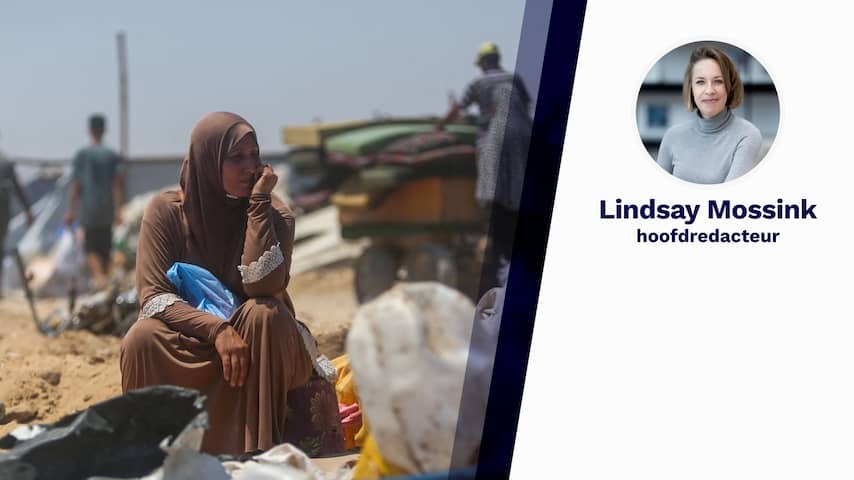
We are happy to make room for discussions. We have been showing for years that we do not shy away from discussions about difficult topics. When we decided last year to close the regular response option among messages about Gaza and Israel, the editors wanted to cost what it costs an alternative.
That alternative has been working very well for a while. Previously three times a week, and now once a week, we do our smelly discussion about Gaza and Israel in the right direction. We call that a ‘talk along’.
Such a ‘talking along’ is always about the latest developments. This week we organized a discussion about the Israeli plan to conduct more than two million Gazanen to one reception camp (that they are no longer allowed to leave afterwards). A forced relocation.
In our introduction to the discussion, we did not choose our words carefully enough. We spoke of a ‘controversial plan’, while we could immediately (in our own title) speak of a violation of international law.
By then briefly sketching ‘pros and cons’, we unintentionally gave the impression of finding the forced relocation a normal plan. This way you run the great risk of warning war violence and actions.
The intention of Israel was simply not suitable as a feed for discussion.
Behind the scenes we spoke to two professors at Israeli universities this week. They spoke of “a chance of better living conditions” in the camp. And also “a way for Gazans to come from under the yoke of Hamas”. More strategic arguments followed.
A small part of it may have been reflected in the introduction to the discussion. While we also decided not to make a story of it. In any case not if we put these arguments against evidence for human rights violations. Because again: we would normalize what is going on.
That does not mean that the Israeli look does not have our attention. It just shows how enormous the gap is between the Palestinian and Israeli perspective.
The Israeli-American professor Holocaust and Genocide Studies Omer Bartov managed to articulate that last perspective last year. Due to anger, aversion or even hatred, ‘the other’ is no longer seen as a human.
That gap is very visible to us every day. Our editors can never do well with this subject, we notice time and time again. With such an open nerve in society, every word that we choose can hurt a lot.
In all cases, the following must be crystal clear: violations are violations, war crimes are war crimes.
We are happy to provide a space for discussions. We have bone showing for years that we do not shy away from discussions about Difficult topics. When we decided last year to close the regular reaction option Under Messages About Gaza and Israel, The Editors Wanted to Offer An Alternative at All Costs.
That alternative has legs working very well for some time. Previously three times a week, and now once a week, we do our best to guide a discussion about gaza and Israel in the right direction. We call that a ‘Join the discussion’.
Such a ‘Join the Discussion’ is Always About the latest Developments. This week we organized a discussion about the Israeli plan to direct more than two Million Gazans to One Reception Camp (which they are then no longer allowed to leave). A forced displacement.
In our introduction to the discussion, we did not choose our words carefully enough. We Spoke of A ‘Controversial Plan’, While We Could Directly (On Own Title) Speak of A Violation of International Law.
By then letterly outline ‘Pros and cons’, we unintentionally cool the impression of Finding the Forced Displacement A Normal Plan. This Puts You At Great Risk of Normalizing War Violence and Actions.
Israel’s Intention was Simply Not Suitable As Food For Discussion.
Behind the scenes this week, we spoke to two professors at Israeli Universities. They spoke of “an opportunity for better living conditions” in the camp. And also or “A Way for Gazans to get out from Under the Yoke of Hamas.” More strategic arguments followed.
A small part of that may have leg reflected in the introduction to the discussion. While we also decided not to make a story out of it. In any case, not if we were to put these arguments against evidence of human rights violations. Because again: that would normalize what is happening.
That does not mean that the Israeli perspective does not have our attention. It only shows how huge the gap is between the Palestinian and Israeli perspective.
The Israeli-American Professor of Holocaust and Genocide Studies, Omer Bartov, was Able to Express That Letter Perspective Well Last Year. Through Anger, Disgust or Even Hatred, ‘The Other’ is no longer Seen as Human.
That gap is very visible to us every day. Our editors can never do well with this topic, we notice time and time again. With Such an open nerve in society, every we get choose can unintentionally caus a lot of pain.
The Following Must Be Crystal Clear in All Cases: Violations Are Violations, War Crimes Are War Crimes.